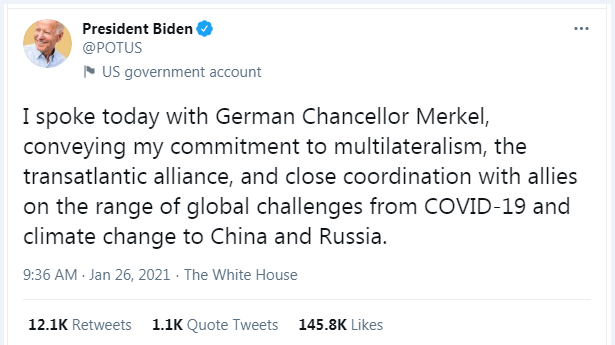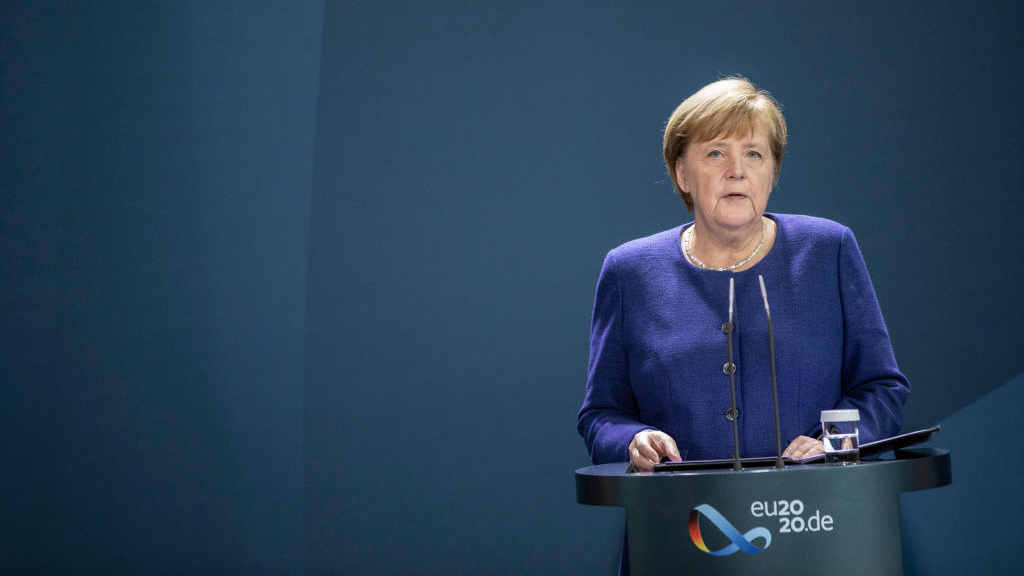
A screenshot of U.S. President Joe Biden's tweet that the common challenges of the U.S. and Germany include "China and Russia." /@POTUS
A screenshot of U.S. President Joe Biden's tweet that the common challenges of the U.S. and Germany include "China and Russia." /@POTUS
Editor's note: Bradley Blankenship is a Prague-based American journalist, political analyst and freelance reporter. The article reflects the author's opinions and not necessarily the views of CGTN.
During a January 25 phone call, U.S. President Joe Biden and German Chancellor Angela Merkel discussed a range of issues of mutual concern, which included the strengthening of transatlantic ties that were weakened during the previous administration of former President Donald Trump. While both sides agree that relations between the U.S. and Germany will likely improve, it's apparent that their priorities may not be in the same place.
According to German federal government spokesman Steffen Seibert, the two leaders agreed on the need for multilateralism and, in this vain, the German side welcomed the U.S. back to the World Health Organization (WHO) and the Paris climate agreement. On key foreign policy, according to Seibert's statement, the two sides discussed issues related to "Afghanistan and Iran, as well as trade and climate policy."
Though there is room for agreement between Washington and Berlin because of what Merkel described last week as "a much broader political overlap" with the new U.S. president, there are still bound to be points of contention – which she noted in the context of the Nord Stream 2 pipeline, a German-Russian gas pipeline project that faces bipartisan disagreement from Washington.
A Reuters report on the call noted that key points of interest for Berlin in the coming months are "the taxation of the digital economy and a global minimum effective tax for companies," which are efforts that were undermined by the Trump administration. Germany apparently sees more promise in the Biden administration in facilitating the so-called "Great Reset" that would see the global economy emerge more equitable after the COVID-19 pandemic, which falls in line with Biden's "Build Back Better" campaign slogan.
Washington's priorities seem to be totally different, however. Biden tweeted on his official government account after the call with Merkel in a way that would seem fairly innocuous to a domestic audience, but was quite surprising for international observers.
He said, "I spoke today with German Chancellor Merkel, conveying my commitment to multilateralism, the transatlantic alliance, and close coordination with allies on the range of global challenges from COVID-19 and climate change to China and Russia."
The last part raised more than a few eyebrows given the fact that it was not officially mentioned by the German side. It shows quite clearly that viewing Russia and China as "global challenges" to be overcome rather than partners to be engaged with – especially at a time of unprecedented upheaval that requires global cooperation – is a view confined to Washington.

German Chancellor Angela Merkel speaks to the media following the projection by news outlets of Joe Biden as the winner of the 2020 U.S. presidential election in Berlin, Germany, November 9, 2020. /Getty
German Chancellor Angela Merkel speaks to the media following the projection by news outlets of Joe Biden as the winner of the 2020 U.S. presidential election in Berlin, Germany, November 9, 2020. /Getty
Europeans have long embraced the bold project of a united continent, free of division that so often leads to destruction – which is the very principle of the European Union (EU) and a principle near and dear to the soul of modern Germany, a united nation once bitterly divided.
Even though multiple world wars and then an enduring Cold War tore Europe to shreds and left it split in the last century, Europe has transformed itself into a cosmopolitan hub that adapts to modern challenges with diplomacy as a starting point. While the EU so often followed Washington into blunderous foreign policy decisions on the false promise of an enduring Pax Americana, those blunders only became more apparent and blameworthy after the end of the Cold War when the pretext of containing the spread of Soviet influence no longer applied.
The previous administration of Donald Trump only solidified Europe's resolve in multilateralism. Traditional American partners in the EU saw once again that the outcome of conjuring a bogeyman, whether be it Russia or China, to justify zero-sum politics is only mutual destruction. Because of this, the EU has been forced to pursue an objective of strategic autonomy more enthusiastically than ever before because Washington, a perennial partner with supposedly shared values, proved not only unreliable – but actually dangerous.
This has been reflected in the EU moving forward on climate policy with or without the U.S., upholding the Joint Comprehensive Plan of Action (JCPOA) despite Trump's efforts to undermine it, pursuing an independent energy cooperation with Russia and signing the much-anticipated China-EU Comprehensive Agreement on Investment (CAI). The latter two have been denounced by the Biden administration but are hugely important to the EU's long-term interests.
Biden and his administration have touted the line that "America's back" and look forward to getting back to business as usual with key American partners, counting on the EU to be a sure bulwark for American interests. The problem is that the EU and its member states, like Germany, have already rejected "America First" and couldn't care less if such a mentality goes by another name.
(If you want to contribute and have specific expertise, please contact us at opinions@cgtn.com.)

